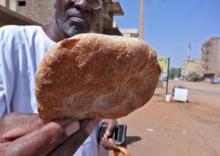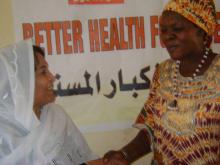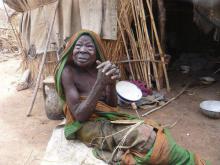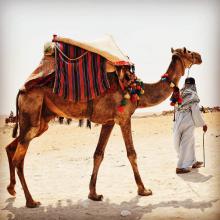
Fighting in Darfur started in 2003 when communities living there took up arms against the government in Khartoum, accusing it of marginalizing Darfur. According to aid workers, at least 200,000 lives have been lost while over two million people have been forced to flee their homes.
The United Nations Emergency Relief Coordinator now estimates that almost 300,000 people have died from disease and malnutrition. Darfur is considered to be the world's worst ongoing humanitarian crisis.
Up to 60 per cent of villages have been "destroyed, burnt or abandoned because of attacks from the two parties. Crimes against humanity in Darfur, and the delay in solving the problem without an adequate response of the Sudan government is a demand of people of Darfur
According to the International Crisis Group, Darfur represented the "potential horror story in 2004". The Overseas Development Institute says there is "a clear risk of large-scale famine mortality"
The political and humanitarian crisis in Sudan resulted in high death rate . Deaths, atrocities and threats resulted in emigration of the population to non conflicted areas . During conflicts many old people were left alone and younger population migrated to non conflicted areas requiring assistance in more than 124 different locations. Host communities are suffering too. Delivering much-needed aid is an immense challenge in Darfur because people are scattered over a vast land area, and communications have been badly disrupted. Accessing those in need requires intense collaboration by all. A massive scale-up in international commitment, action and effective ground presence is needed now to save precious lives.
Many displaced people have sought security in camps. Approximately 8% of these are older people, half of whom live alone..
Older people in displaced camps are living in very bad conditions with lack of sanitation, malnutrition, shortage of clean water and rains. All these will lead to major health catastrophe. Older women have a longer life expectancy than men. They may also be at greater risk of poor health if they live alone (having outlived their older spouse and, for one reason or another, not living with one of their children). Older women, regardless of their residential status, appear to experience more morbidity and disability than older men, and report using medication and visiting providers more often than men
Violence against older women is a result of gender discrimination. Older women had married early, have many children, and live in poor conditions with other wives of her husband. The dependent position of the frail old women everywhere makes them vulnerable to abuse in the family, and in care.
Because of a poor roads as well as insecurity along routes, not all IDP communities are accessible ,but different IDP camps are lacking food, water, health care and shelter. As IDP camps grow, so does the pressure on the health system, which is poor even at the primary level. Secondary and tertiary health care is practically non-existent outside of the state capitals.
People of Darfur found security in displacement camps such as women and children make up the vast majority of people in the camp – there are very few men. HelpAge International staff estimated that approximately 10% of those in the camps are older people, mainly older women.
Since the gender composition of the aging population is well marked in most of the countries, women have less access to resources that lead to poor health.
Females outlive males in all over the world, so in number women predominate in total population. Women, who tend to outlive men, can expect to face widowhood and poverty. Women dominance does not mean that they are healthier than males.
Old people proved to be fully economically productive. In Darfur, a large proportion of the elderly contribute to agriculture. Their self-employed activities often remain invisible and hire less
Help Age International estimates that 160,000 older people live in relief camps and of these around 30 per cent not covered by aid programs of humanitarian organizations. So older people in the camps are less targeted in international humanitarian food and health programmes. They suffer from different disabilities that make them unable to reach the food registration centers. HAI research found few older people had adequate food, either in quality or quantity. Around 20 per cent were only eating one meal a day. Older women share rations with orphaned and other grandchildren .
Barriers of older women in getting needs :
There are political barriers, social beliefs or cultural,isolation ,economic,marginalization and illiteracy
• Political barriers such as rape with impunity , disagreement between rebels and governments, no serious management of the problem and ethnic intertribal conflicts ,all of these contribute in the miserable situations of older women in Darfur.Armed militias are continuing to rape older women and girls with impunity.Why women in darfur suffer a lot from violence rape and the miserable situations in which they live , inspite that she always calls for peace ,she never supports wars ,nevertheless she is a victim of conflicts and wars.
• Social beliefs are barriers for older women because of inability in expressing herself within community members,policy makers and between the women and health care providers. These social attitudes can affect the health of older women who neglect their own health in many ways. Old women voice not heared, they mght be influential . One husband for multiple wives with high fertility rate is also a barrier.
• Isolation is threatening women’s development. Older women not Integrated within their new communities in camps. Absence of equality of opportunities through out lives with lack of communications .Many of older women live alone, most are widows, without extended family and economic support.
.
• Economic barriers preventing older women in Darfur in getting medicines and adequate nutrient products which results in poor health and malnorishment . Older women lack employment opportunities this results in increase of poverty among the older women in Darfur.Lack of programs to enable all workers to aquire basic social protection ,social security including pensions,disability insurance and health benefits increases poverty to older women. Disabled older women lack income for older women particularly to those who are socially and economically disadvantaged and finally illiteracy is also an economic barrier.
• Marginalization of the older women in camps,rural and remote areas in Darfur with non recognization of the benefits of increased experience with age.That is no full utilization of the potential and expertize of persons of old age.Unrecognized social,cultural,economic and political contribution of the elderly women that is why participation of the older women in decision making processes is restricted
• Illiteracy is the most negative factor behind women’s underdevelopment in Darfur . Illiteracy in Khartoum the capital of Sudan among elderly population constitute 60% , 40% goes for older women.
Health situations:
Darfur had very poor support for health since 1993,. From the already small, normal government expenditure on health of 3 US dollar per capita per year, only a very small part was spent on Darfur , WHO .
Health fascilities during the conflict were destroyed and equipments were stollen . Most staff had left, because of deteriorating security and salaries that had not been paid in 2003 . Secondary care to cover services for the people in Darfur was poor because of the inadequate infrastructure : bad roads, deficient water supplies, and power sources, poor availability of raw materials and medical equipments beside the small number of qualified doctors.The Ministry of Health at State level, did not receive sufficient support from the national or Federal level.
It is estimated that only 12% of the potable water needed is currently available. Such poor conditions have led to a rise in mortality, with instances of increased mortality rates. Without the massive humanitarian relief given to the people of Darfur, the mortality rate will markedly be increased.
The miserable conditions in the camps i.e. shortage of clean water makes personal hygiene inadequate, inadequate latrines, non healthy environment , the nonsuitable huts in which they live. all these make unhealthy conditions not suitable for human beings. Water from open wells as seen in the camps is susceptible to contamination in many ways where sanitation conditions are poor. Rate of morbidity and mortality increase when there is inadequate food, unsafe water, improper sanitation and shelter, absence of public health inputs like vaccinations and insufficient access to medical care.
By donkey water is transported with goat bags made by goat skin on donkeys which is a traditional way of transporting water from one location to another. Water has the potential might be infected as it is not chlorinated.
Health services collapse during conflicts and emergencies, and cannot offer desperately needed services. The government will not be able to provide adequate services.
In Darfur infectious diseases are dominating and of less degree the chronic degenerative diseases. Infectious diseases tend to contribute more in mortality rates as malaria, diarrheas; they continue to be a significant cause of morbidity and mortality
The older women in Darfur do not always have access to proper shelter and sanitation and health treatment for chronic diseases and illnesses, such as eye problems, lack of prevention of diseases, which lead to high mortality. Insufficient medical supplies and absence of a patient transportation system are threatening conditions.
Health needs of older women in Darfur:
There are several health related needs are of concern for older women in Darfur:
Nutrition and water safety,adequate shelter, spiritual,recreation,mobility and communication needs . These needs if met prevent ill health among the elderly. Develoment and strengthening of primary health care services to meet the special continum health needs of the elderly is of great value.Awareness among the elderly about ageing issues and provision of training for the elderly in different ageing issues are urgent needs.Development of mental health care to reduce cognitive functions disabilities is alo an urgent need. Addressing the health needs of older women requires a multidisciplinary approach that addresses government policies, public awareness and attitudes, and social services, in addition to the health care delivery system. Programs should recognize that older men also face challenges as they age.
Different studies have emphasized the fact that the provision of integrated health and social care of the elderly in the community enable the elderly to maintain active ageing and lead them to independence within the desirable surroundings.
Of particular importance is the primary health care strategy, which enables the elderly to maintain independent lives in the context of family and community.
It is the first level of contact of individuals with the health system, provides health care where people live and work under 5 principles, equity, community participation, promotive- preventive approach, appropriate technology and a multisectoral approach.
Current health systems are designed to provide episodic, acute health care but the new paradigm will be caring for lifecourse.Therefore international organizations as partners with ministries of health in Darfur states should work on implementing specialized primary health care for the elderly in primary health care settings.
Mortality in darfur:
There are life threatening diseases for internally displaced people. However intensified health prophylaxis will improve conditions. The main causes of death are acute respiratory infections, diarrhea, and malaria WHO .Mortality rates amongst internally displaced people is high more than the threshold for humanitarian emergencies. The WHO survey found the crude mortality rate to be 1.5 deaths per 10 000 people per day in North Darfur, and 2.9 in West Darfur. Results show that displaced people are dying at between three and six times the expected rate. The humanitarian community is doing a lot to reduce mortality rate by improving health and nutritional status.
Tips to other organizations:
It is very important for organizations in Darfur to work on ensuaring enabling and supportive environments for older women by :
• Assisting in establishing adequate housing options to meet the special needs of the elderly in displacements camps in particular those with disabilities
• Making adequate transportation for the older women
• Supporting older women who are care givers through training in ageing issues
• Supporting programs for elimination of all forms of neglect abuse and violence of older women
• Encouraging and acknowledging the wisdom ,expertize and the contributions of the older women into society
• Disseminating the principles of the Committee of the Convention on the Elimination of All Forms of Discrimination Against Women (CEDAW) about abuses of older women’s rights and make a series of recommendations to the government to take action.
• Ensuring older women have full access to health and social services and decision-making processes, as well as adequate and appropriate jobs in the labor market
• Adopting special programs to alleviate older women’s poverty
• Protecting older people by including them as a vulnerable group in all relevant areas of humanitarian law and practice
• Integrating older women , and ensuring older people’s participation in all programs and projects and involving older women’s interests into the organizational policies
• Training international and national organizations in ageing issues
• Establishing of database in order to provide appropriate support to older women.
• Contributing in establishing National policies in ageing
• Supporting networking with regional and international NGOs and the International federation on ageing
• Considering the awareness and advocacy among policy makers for non contributory pension system and disability benefit system for the elderly
• Advocating for special economic benefits for women, who tend to outlive men, can expect to face widowhood and poverty in Darfur.
• Making special efforts to raise the participation rate of older women in Darfur
• Assisting in creating programs in reducing illiteracy among older women
Common Women's Health Problems in Darfur:
Women enter old age carrying the burden of gender disparities,
including chronic
health problems associated with childbearing, poverty, widowhood,
vulnerability
to violence, and the burden of care giving
Inequities in health in Sudan is very significant therefore it is
important to
study the impacts of social determinants on health as this provides
evidence
based data necessary in policies development for improving the
health situation
of older women in Darfur. The social determinants are
multi-dimensional
and interrelated themes that influence health outcomes. They are for
older women in Darfur: early marriage,violence against women,
high fertility rate, gender discrimination, illiteracy, financial
insecurity and lack of control over their own income, unemployment,
female genital mutilation and lack of rights to social protection.
The social
determinant of health in conflicts and emergencies illness is believed
to be more
common among women in Darfur than among men .
For the welfare of women in Darfur it is important to empower older
women ,
find employment, fight against female genital mutilation and
inequitable health
Services provision, stop conflicts and wars as this results in health
inequities.
Strategies development for addressing social determinants on
older women’s
health in Darfur should involve the advocacy of the inclusion of
social determinants
on health in programs targeting older women.
Female genital mutilation is a potential health hazard for older
women .The
practice is most common in Darfur . The health impacts lead to
chronic infections
and long-term effects such as abscesses and cysts . Older women do
approach
doctors asking for decircumsision to relief them from the repeated
infections.
WHO had inspected the three Greater Darfur Internal displacement camps
and described the group of environmental hazards that cause
more casualties
and human sufferings, particularly to women.
Hepatitis E is a viral disease with no available therapy for reducing
features
of morbidity. As no specific therapy is capable of altering the course
of acute hepatitis
E infection, prevention is the most effective approach against the
disease.
The outbreak of hepatitis E in camps in Darfur Region and the risk
of a cholera
outbreaks are urgent needs to speed up water and sanitation
activities in
internal displacement camps.
Consumption of faecally contaminated drinking water has given rise
to epidemics,
The risk factors for hepatitis E infection are related to poor
sanitation in large areas of the
World .United Nation had improved the access to clean water
and sanitary
latrines coupled with health and hygiene education and promotion
as one
of five life-saving strategic priorities along with food and agriculture,
health, shelter
and non-food items
Cholera is mainly transmitted through contaminated water and food and is closely linked to inadequate environmental management. The absence or shortage of safe water and sufficient sanitation combined with a generally poor environmental status are the main causes of spread of the disease.
Malaria is a disease which can be transmitted to people of all ages. It is caused by parasites of the species Plasmodium that are spread from person to person through the bites of infected mosquitoes. If not treated promptly with effective medicines, malaria can cause severe illness that is often fatal.
Darfurian women workers are employed in the most stressful forms employments with high demands and poor payments.Working in building constructions results in musculo-skeletal problems such as strain injury, shoulder pain, backache and upper and lower limbs pain.
Working women in Darfur have to move heavy loads and expend high levels of muscular effort.Beside these physical hazards in the workplace older women in Darfur may also face physical risks at home as well as other psychological stresses.
Other health problems of older women in Darfur include non communicable life-threatening cardiovascular conditions , cancer, incontinence ,osteoporosis and mental health disorders such as dementia and depression.
Older Women in Darfur have pelvic health problems by Age 60 such as uterine fibroids ,stress urinary incontinence pelvic organs prolapse throughout their reproductive years and into later life, in part due to the limited medical care they receive during labor and delivery . Common problems include infections, stress urinary incontinence, cervicitis, and uterine prolapse. Obstructed labor, leads to serious problems. These include fistulas, bladder problems, pelvic inflammatory disease, and neurological damage results in loss of fecal and urinary control associated with fistulas. These horrible complications can change women’s life into grieves.
Among fall-related injuries, hip fractures are the most common as a result of osteoporosis, are associated with the highest hospitalization and mortality risk. In addition to injury and hospitalization, falls and associated fractures also result in serious short and long term physical and psychological effects that are further complicated in older women in Darfur when associated with increased co morbidity and the poor treatment by the health care system.
Many of the leading causes of visual impairments for older women in Darfur associated with aging are cataract, glaucoma, and macular degeneration. Adequate services especially for cataract had been provided by different international organizations which gave very encouraging results that changed the quality of life in later years for older women in Darfur. Still more efforts needed to larger scale of visually disabled older women in Darfur.
Mental illness is believed to be more common among women in Darfur than among men for women it is commonly associated with spousal violence, with having many children, with illiteracy, financial insecurity and lack of control over their own income. Mental distress may also be related to the new demands of work,at home and the changing negative conditions by wars and conflicts. Mental health of older women in Darfur who had been subjected to sexual violence and the longer term health needs for children are additional concerns.
Undernutrition of older women remains a serious problem in Darfur, especially among poor families in displacement camps.As a rule grandmothers share their aids with their grandchildren.
Help Age International’s response in Darfur:
Help Age International HAI is the only specialized organization working for the sake of the elderly in Darfur. It had called all humanitarian organizations working in Darfur to mainstream aging issues and improve aid provision for older people.
Training facilites in ageing issues recommended and implemented by HAI to other organizations working in Darfur . HAI works in partnership with international influential organizations in Darfur,planning and implementing together for meeting the health needs of the elderly in Darfur.Establishing and strengthening old women commitees to face both government and rebels in Darfur is a basic goal for HAI.This work will ensure that older people, particularly older women are integrated.
HelpAge International aims to provide food, shelter and health services to displaced older people and their families.
HelpAge International is committed to working with local and national governments, relief agencies, international bodies and funders to ensure that older people in Darfur receive their human rights in conflicts and wars.
The effects of prolonged displacements create problems in funding and implementation of programs .In response to this Help Age International produced a report "Rebuilding lives in longer-term emergencies" reflects the need to create longer-term responses in Darfur.
This report draws on field research to highlight the situation of older people who have been displaced in West Darfur as a result of the conflict which began in 2003. The report reflects the importance of developing longer-term responses in rebuilding communities in Darfur.
HAI produced a publication about awareness of HIV and AIDS in Southern
Sudan .
This publication outlines the reasons for recognizing the key role of older people as counselors and carers.
HAI produced a leaflet (Supporting older people in Darfur )
This leaflet sets out the issues faced by older people living in displaced people's camps in the Darfur region of Sudan. These issues include isolation, limited mobility, health, older people as carers, psychological and social effects and lack of intergenerational support.
The leaflet also puts forward a series of suggestions for best practice in prolonged emergencies.
A research health and nutritional status and needs of older people in emergency situations of Darfur was held in West Darfur.
This research highlights some of the key issues affecting the nutrition and health of older people in Darfur and suggests ways in which their health needs can be more effectively addressed.
Help Age International is working in ten camps for the displaced in West Darfur, where there are high concentrations of older people.
HAI had esablished older people’s committees in the camps to represent the needs and rights of older people. The committees act as represntatives for older people to International agencies .
HAI supports West Darfur State hospital with the supply of appropriate drugs
HAI supports the three States in Darfur with training in ageing issues for medical professionals and paraprofessionals
HAI organized eye programs in West Darfur camps for eye care including surgery.
Conclusions:
This report reflects the situations in Darfur and accordingly how the situation influences the life of the general population in general and old women in particular. The report provides a background for developing policies and strategies to improve the health and well-being of old women in Darfur. Analysis of the social determinants of health provides an appropriate entry point to better comprehend inequities in health, put them firmly on the Darfur Regional Policy agenda and create demand for action to address them in order to improve the situation of the older women in Darfur and in particular the least advantaged. Help Age International played the greatest role in providing services to the elderly and awareness and advocacy among policy makers and among international influential organizations . Still the gap between needs and available relief is too big in Darfur . This cannot be reached unless the war stops






